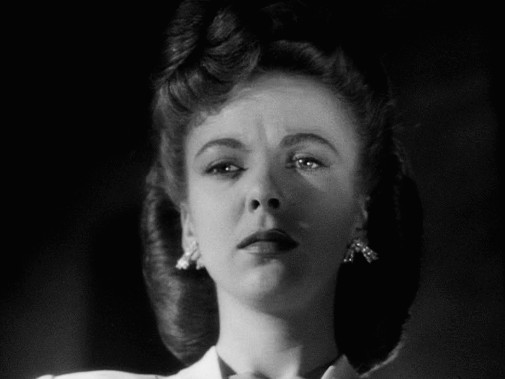
Last week in the Almost There series, we took a look at Cher's performance in Robert Altman's Come Back to the 5 & Dime Jimmy Dean, Jimmy Dean. That film's part of a new Criterion Channel collection in celebration of Mother's Day. Beyond that program, the channel is bursting at the seams with enticing new offerings. So much so that we'll choose all of our May subjects from the streamer. Today we're talking Ida Lupino, whose career is featured in a selection of 13 movies spanning from 1935 to 1956. Though she was a popular Hollywood actress and even found success as a director, the British-born thespian was never nominated for an Oscar.
She got relatively close a couple of times, though. Regarding the Best Actress Academy Award, Ida Lupino's best bet was surely 1943's The Hard Way…
Reportedly inspired by Ginger Rogers' troubled relationship with her first husband and forceful mother, The Hard Way came from a story by Irwin Shaw. Vincent Sherman directed the drama with musical interludes, though Shaw supposedly wanted Howard Hawks or William Wyler for the job. With the help of legendary cinematographer James Wong Howe, the director pursued a balance between textual melodrama and a sense of realism, an underlying grittiness to ground the character's ambitions. Such efforts result in a tense movie, always trembling under the pull of opposing forces. It never unravels itself into oblivion, but one senses that possibility.
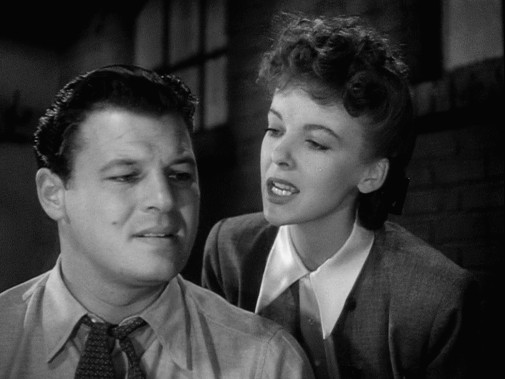
On the one hand, The Hard Way is an old-school rags-to-riches story with a fairytale gloss only found on stage and the silver screen. But, on the other hand, it's observed in all its clawed-out despair, lives destroyed in the name of fame and fortune. Most of all, the film is shaped by its central performance, a piercingly individualistic characterization by Ida Lupino in the role of Helen Chernin, a woman who'll do anything to escape from material misery. Her ticket out of such despondency proves to be Katie, a younger sister she cajoles into marrying a song and dance man before micromanaging her meteoric ascension in showbiz.
At this point, Lupino's career had been a tale of treacherous transmutation, a victim of studio execs who were unsure of what type she should occupy on the screen. In the early 30s, she was dubbed the "English Jean Harlow," though profoundly unlike the original blonde bombshell. Years of mismanagement at Paramount lead her to seek work at other studios, first finding some success in Columbia. However, Warner Bros. was where she'd find her place as a dramatic actress. There, blonde locks dyed dark, Lupino became one of the first great femme fatales of film noir.
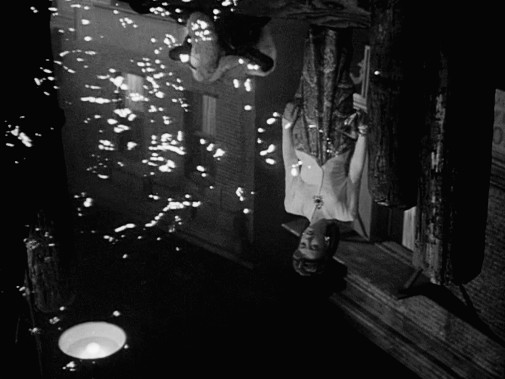
Exuding an air of obstinate toughness and cutting smarts, Lupino could bring noir to any project she walked into. That's even true of those domestic dramas where she was akin to the poor man's Bette Davis, in the actress's own words. Such is the case in The Hard Way, whose very start seems to predict Mildred Pierce's iconic opening two years later. Walking near the waterfront, Lupino's Helen wanders from shadow to light, the shimmer on her face like a silent accusation. Stoney yet emotional, she regards the depths. Then, she jumps.
The film proper starts in flashback, as Helen convalesces in a hospital bed after her suicide attempt. The camera surges into those haunted eyes as two policemen interrogate her, the gaze quickly fading from hazy to resentful. The movement precipitates the movie into the land of memory, and we find Helen and Katie living an existence of constant craving. Quickly, one notices the difference in their dynamic, how the older sibling is more of a mother than a sister. Fawning over the unachievable luxury of an eight-dollar dress, Katie flutters and flitters in youthful exuberance while Helen looks on, quieter, calculating.
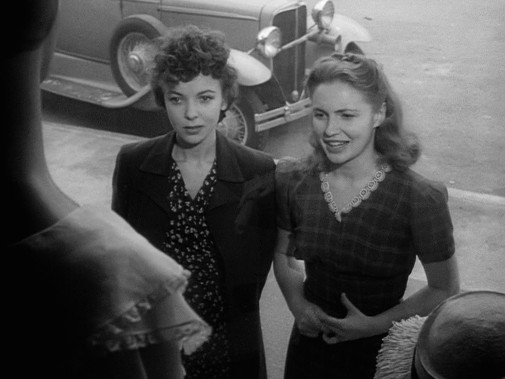
She knows the frock is out of reach, yet Helen's still willing to fight with her husband for money. There's a caring preoccupation with shielding the girl while, inside, the married woman seethes in anger against her precarious position. Lupino avoids playing these scenes with malice, matching the character's actions with a selfless desire to give Katie a better life. It's only gradually that Helen's coveting ways sour into selfishness, an evolution Lupino shows by blending the woman's two faces. At a certain point in the story, devotion has been mixed beyond measure with private hungers, public shames. Affection is thus obfuscated, sisterly bonds crumble.
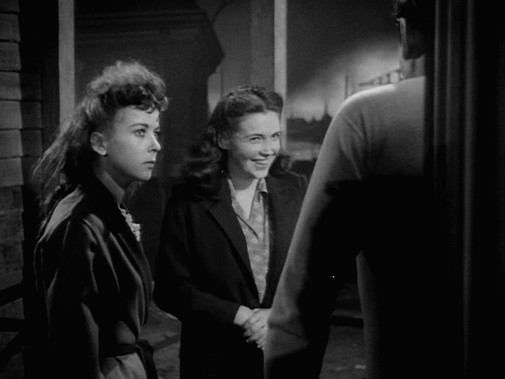
Not that either performer or character does much to obscure their uglier side. Even in her harsher passages, firing lines with staccato urgency and a mannered bite, Lupino finds chances for powerful, unhidden reactions. No matter how much she screams at a dumpy spouse, Helen's true darkness is better seen between shouting matches. Notice a look of disdain here, the cold-blooded, deeply undemonstrative flash of calculation there. Regard how her lying ways evolve through the movie, starting awkward and becoming more fluid with each new grift.
In these fits and starts, loudness followed by quiet pauses, Lupino's performance displays a quasi-musical quality. Her Helen is a cruel symphony with a counter-melody floating to the surface at critical points. When breaking her brother-in-law's heart, for instance, she holds herself still and serene. She's almost meek as she plunges the dagger into his back. Curving slightly into herself, arms folded in a self-hug, Lupino shines a light on Helen's conscience, how disappointment hurts and other people's pain provides no pleasure. Later in the movie, that is best showcased when sharing scenes with Dennis Morgan's Paul and Gladys George's Lily.
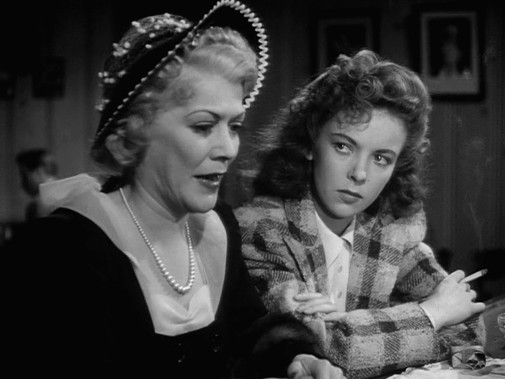
She's a middle-aged star of the stage who Helen manipulates into a boozy downfall, opening up opportunities for Katie. Faking compassion, Lupino wears a mask of inexpression, speaking words she doesn't mean with chilling dispassion. As for Paul, he's the only person who sees right through Helen from the moment they meet. While he fails at keeping his friend from marrying Katie, the man's never fooled. Indeed, that intelligence sparks something deep in Helen, something Lupino plays as the thrill of being seen - truly seen. Romance never blossoms between the two, but the actors charge their shared scenes with an erotic current.
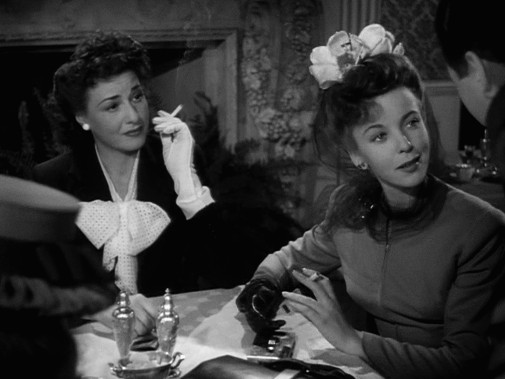
Apparently, Lupino wasn't too fond of this performance, though one shouldn't put much stock in such sayings. Artists are seldom the best judges of their work. Nevertheless, it's difficult to imagine The Hard Way working as well without her contribution. In its present form, the film's text glistens with the possibility of misogynistic interpretations, equating a woman's ambition to an essential wrongness. And yet, Lupino's work has a hard specificity that complicates the script's more reductive traits. If there's a weakness in her approach, it's the narration that sometimes feels like it lacks the actress' effortless individualism.
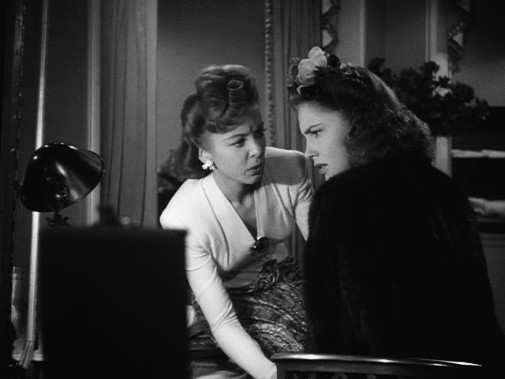
By the time The Hard Way came about, Ida Lupino was already a critical darling among her Hollywood circles. The Sherman movie fulfilled all the dramatic promise the actress had exhibited in her 1940/1 breakout year. For this performance in The Hard Way, Lupino won the prestigious NYFCC Best Actress prize, beating that year's eventual Best Supporting Actress Oscar winner Katina Paxinou. But unfortunately, AMPAS ignored the English star choosing to nominate Jean Arthur in The More the Merrier, Ingrid Bergman in For Whom the Bell Tolls, Joan Fontaine in The Constant Nymph, Greer Garson in Madame Curie, and Jennifer Jones in The Song of Bernadette. The latter won, while Ida Lupino was never nominated for Hollywood's most coveted trophy.
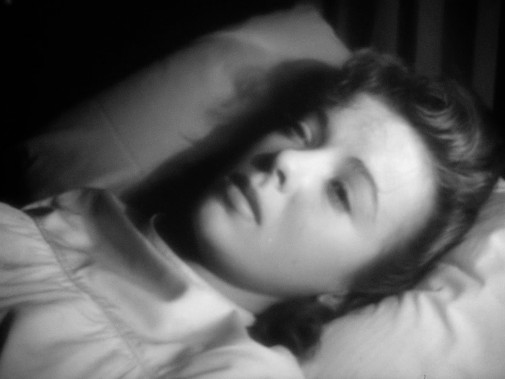
The Hard Way is currently streaming on the Criterion Channel as part of their Ida Lupino collection.